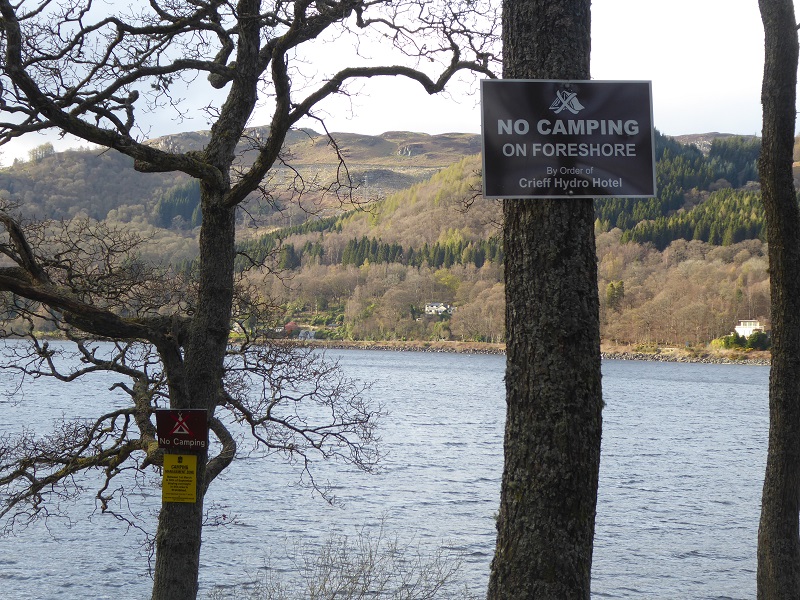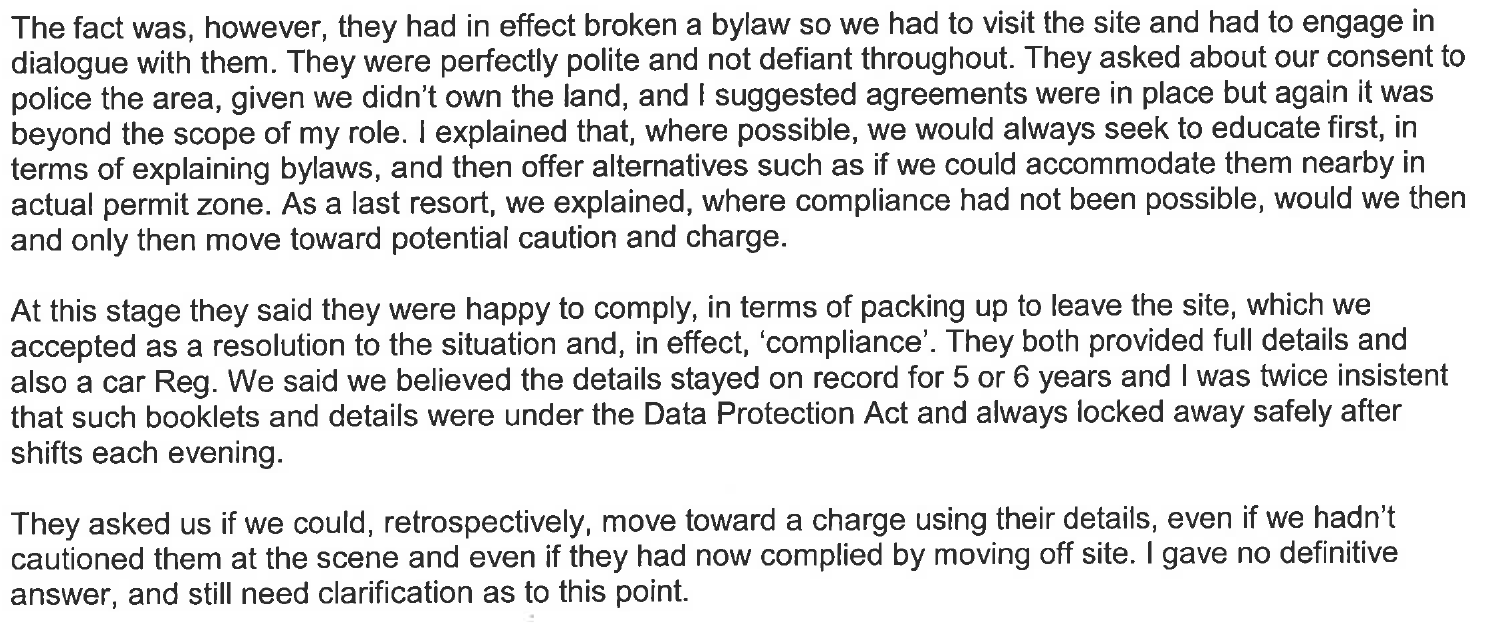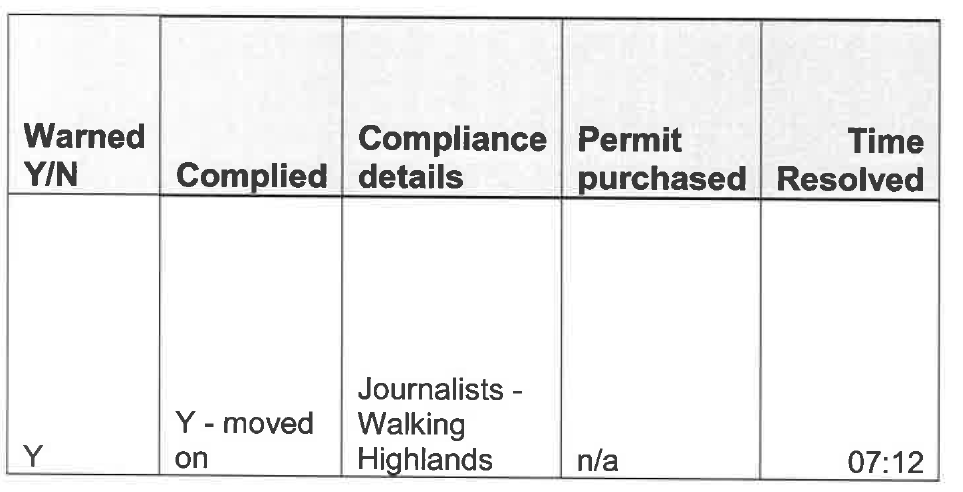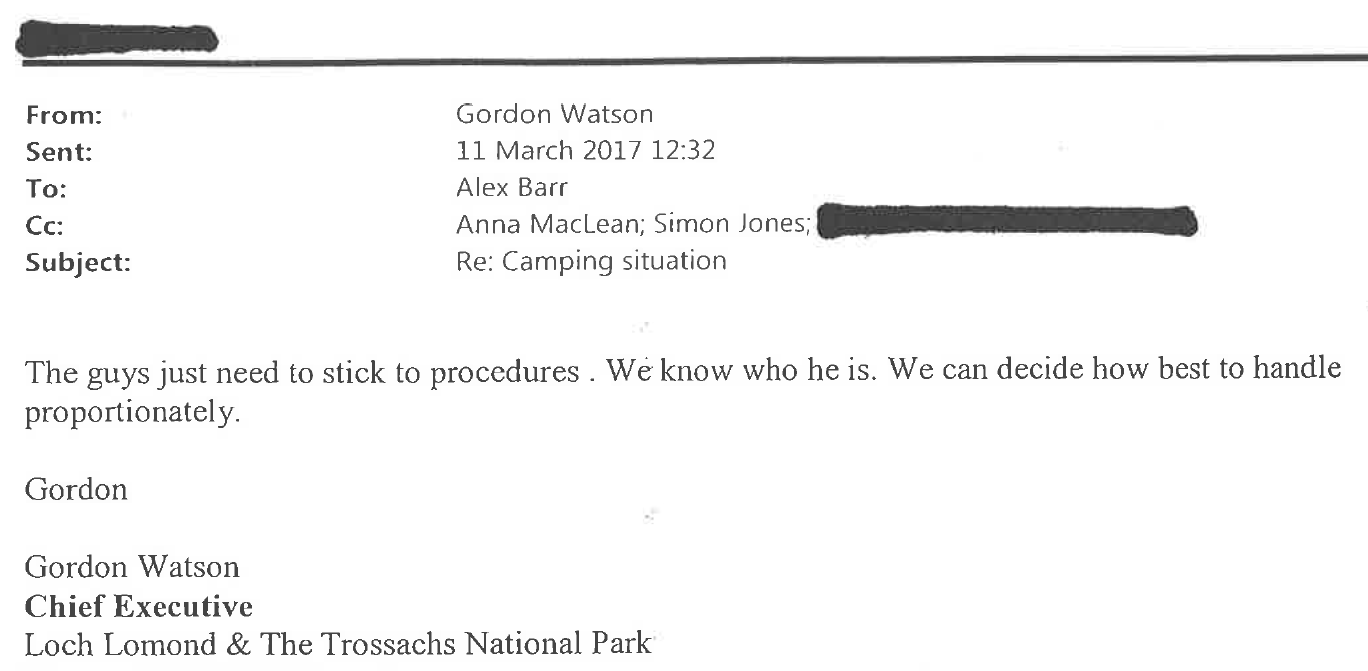
Scotland’s own “Windrush” problem?
Following my post on parkswatch and the GDPR (see here) this post takes a look at the civil liberties and governance issues which have been created by the Loch Lomond and Trossach’s National Park Authority’s collection and processing of data under the camping byelaws, itself the outcome of the byelaw enforcement process which makes a mockery of human rights and the principles of natural justice.
As the UK Government struggles to extricate itself from the scandal caused by its “hostile environment for immigrants” policy we need to ask if Scotland has created its own mini-version of the Windrush problem. Instead of immigrants arriving from overseas on the good ship Windrush we have visitors arriving in the Loch Lomond and Trossachs National Park to be greeted with a “hostile environment for campers” policy. As in the Windrush scandal, this post will show that this hostility is accompanied by administrative chaos, procedural incompetence and an enforcement process which undermines basic civil liberties. At the heart of this scandal is the National Park Board and the lack of effective political oversight
This post is based on the material published by David Lintern in his Subject Access Request which can be seen through a link in his fine post about his test of the byelaws last year and a series of information requests and follow up reviews from the LLTNPA: EIR 2018-001 Response byelaws, EIR REVIEW Response 2018-001 byelaws, EIR 2018-002 Response enforcement, EIR 2018-002 Review response, EIR 2018-008 Response enforcment byelaws. The responses are sometimes convoluted and hard to follow, with information being released in dribs and drabs, and only some have been published by them – hence the links given here.
Background – Data protection and enforcement of the camping byelaws
Camping byelaw (9) makes it a criminal offence for a person to refuse to provide their name, date and place of birth, address and vehicle registration number to an officer of LLTNPA or the police (or other person authorised by LLTNPA) who has reasonable grounds for believing that such a person has committed an offence under the byelaws. (There is a similar provision under the water byelaws). This gives authority to these authorised persons to challenge people camping informally within a Camping Management Zone and to collect certain personal details where they have reasonable grounds to believe an offence has been committed e.g they have spotted a tent or other shelter within a camping management zone and that tent/shelter is not compliant with other byelaw provisions, the main one being people can camp in certain places with a valid permit.
The information collected is covered by the Data Protection Act and is classified as “sensitive personal data”, rather than just “personal data”. There is provision under that Act for the data to be processed without the consent of the data subject and any sensitive personal information about campers sent to the Procurator Fiscal would, for example, come under this category. This is clearly stated in the LLTNPA’s updated privacy statement which appeared just before the GDPR came into effect:
“Personal information is processed for the purposes of reporting byelaw infringements, in terms of the Camping Management Byelaws 2017: http://www.lochlomond-trossachs.org/rr-content/uploads/2017/02/Camping-Management-Byelaws-2017.pdf”
The problem is that the LLTNPA is using flawed procedures in its enforcement of the byelaws, both in the way that it challenges persons who it considers are in breach of the byelaws and therefore the way the data is collected and in the subsequent use of the personal data collected during this process.
The collection of personal data has been turned into a warning “system” without any lawful authority or due process
In the LLTNPA’s report to Ministers last December they reported that 828 people had been warned for breach of the camping byelaws. I provided some analysis of this, within the context of David Lintern’s test of the byelaw enforcement process in a post back in March (see here). Since then further information has been elicited from the LLTNPA.
EIR 2018-008 (link above) reveals that every single camper or caravanner suspected of breaching the camping byelaws who gave the LLTNPA information has been treated as having received a warning:
Q: “The number of people LLTNPA staff requested personal details from under byelaw 9 (as opposed to the 828 people issued with warnings for breach of the byelaws).
R The number of people LLTNPA staff requested personal details from under byelaw 9 in the 2017 season of the byelaws was 828.
Q What I am trying to establish is whether all people who were asked for information were warned or not. If the two figures are NOT the same, I would be grateful if you could explain to me why this is so (or failing that would ask for all information the Park holds on why some people whose personal details were collected were not issued with warnings).
A N/A, see answer above.
In David Lintern’s case the evidence clearly indicates he was NEVER told whether he had received a warning or not. David had tested the byelaws by camping informally in a Camping Management Zone outwith a permit area until the arrival of Park rangers on enforcement patrol. Here is the relevant part of the account from the Ranger from his Subject Access Request:
 The ranger’s report indicates that in the event of non compliance further action would follow – i.e .“potential caution and charge”. In the event of compliance the impression is given that no further action would be taken. David Lintern’s Subject Access Request contains information pertaining to a number of further questions he made to the LLTNPA asking about how his data would be used and in none of that information is there any suggestion that a “warning” or caution has been issued to him personally nor any clear explanation given about how his personal data would be used. Nevertheless, despite no warning being given at the scene (or afterwards), the data log, which David also received under his subject access request, records that a “warning” was issued by the Rangers:
The ranger’s report indicates that in the event of non compliance further action would follow – i.e .“potential caution and charge”. In the event of compliance the impression is given that no further action would be taken. David Lintern’s Subject Access Request contains information pertaining to a number of further questions he made to the LLTNPA asking about how his data would be used and in none of that information is there any suggestion that a “warning” or caution has been issued to him personally nor any clear explanation given about how his personal data would be used. Nevertheless, despite no warning being given at the scene (or afterwards), the data log, which David also received under his subject access request, records that a “warning” was issued by the Rangers:

This is a very serious issue both for civil liberties and data protection. What David Lintern’s experience and the FOI response indicate is that the 828 persons who provided their personal details to the LLTNPA in 2017 because the Ranger service considered that they were not compliant with the camping byelaws, were ALL recorded as having been given an official “warning” whether or not:
- they had complied with the Ranger’s recommendations
- they accepted that they had committed an offence
- they had been informed that they were being warned and what the consequences of this would be (both if they committed a future offence and in relation to how this data would be used)
As far as I am aware no letter is issued to people whose details have been collected to inform them or confirm that they have been treated as having received a warning. There is certainly no public procedure for doing this. So, in 2017 the LLTNPA was engaged in a flagrant attack on civil liberties through its use of the camping byelaws. It would appear to have done nothing to correct this in 2018 and so far has failed to modify its data management standards in order to comply with the GDPR.
The legal authority for the warning system
Gordon Watson, the Chief Executive who is responsible for this assault on civil liberties, claimed in material published in David Lintern’s Subject Access Request that all staff had to do was follow procedures:

There were at the time, however NO procedures about how to issue warnings (for evidence of this see below) and how this information would be used and still aren’t as far as I am aware. Moreover, no WARNING system as such ever existed for the east Loch Lomond camping byelaws – there is no mention of “warnings” issued in the review to Ministers of the east Loch Lomond byelaws – and there had been no reference to or authority sought for setting up a warning system in ANY of the Board Papers that has considered the camping byelaws up until now. The FOI responses show this system was set up by staff, allegedly under delegated authority, although exactly what authority they had to do this has not been explained. This is a major failing in governance on what is, first and foremost, a civil liberties issue.
Comparison between the LLTNPA and Police Scotland
Contrast this with Police Scotland who also operate a warning system for people who are accused of minor criminal offences (and which they could use to warn people who they suspect of breaching camping byelaws). There are STRICT RULES about Police and Procurator Fiscal warnings which, among other things, govern how warnings are issued, rights of appeal and how long information is kept https://www.mygov.scot/police-fiscal-warning-penalty/
Under the Police Scotland system people not only have to be told what they are being warned for, they have to ACCEPT the warning and even then have a right of appeal. Under the LLTNPA it appears that people are not clearly told they are being warned, they are given no opportunity to say whether they accept the warning or not, and nothing is said about a right of appeal..
To add further to this shambles, gross incompetence, secrecy and contempt for civil liberties, on 13th January 2018, on BBC Scotland’s Out of Doors a senior Ranger revealed that the LLTNPA holds information on camping byelaw warnings for three years. This statement was incorrect as this FOI response shows:
Your question as to “WHO” authorised the decision that information on warnings could be recorded and kept for three years, the simple answer is no one, as the decision (having regard to the records management plan and retention schedule) was taken that information on warnings could be recorded and kept for 5 years (not 3) and advice will be given to the ranger for this error. (EIR 2018-002 Review).
The LLTNPA is actually holding information about people it has warned for five years. Police Scotland on the other hand, when dealing with exactly the same situation (issuing a warning on a breach of the camping byelaws) would only hold that information for two years. The LLTNPA has provided no explanation as to why it has no formal procedure for issuing warnings, why people are having warnings entered on a database without their knowledge and why they have a different time period for holding that data when compared to Police Scotland who are potentially carrying out exactly the same operation when enforcing the camping byelaws..
Its pretty worrying that not even a senior ranger knew how long information on warnings would be kept. This was not a surprise however because when I had asked the LLTNPA what written information had been given to the Rangers about the warning system I got this response:
6) Information on warnings.
Guidance to staff on the operation of the warning system
The Park Authority Police officer and Visitor Management Adviser were involved in delivering training to Park Authority Rangers on the application of the camping management byelaws, including the use of warnings. Rangers received scenario based training and took part in question and answer discussions to ensure they understood how the byelaws apply. Training materials were not issued for this practical element of their training. Accordingly I have to advise under S10(4)(a) of the EIRs that there is no information held.
Rangers were also provided with the Visitor Management Engagement and Enforcement Policy, available at: http://www.lochlomond-trossachs.org/rr-content/uploads/2017/03/Engagement-and-Enforcement-Policy.pdf
Its not the Rangers fault that they have no written information about how the warning system operates even though another FOI response clarified that:
“The Ranger service has been able to issue warnings in relation to infringements of the Byelaws since they were introduced on 1st March 2017”.
The LLTNPA Enforcement Policy (see here), dated February 2017, states that “Park Authority staff will be responsible for and will make initial judgements in the field in determining whether a relevant byelaw and / or piece of legislation has been contravened and that there is sufficient evidence to issue a Fixed Penalty Notice or consider submitting a report to the Crown Office.” There is NOTHING in the policy to say that from 1st March 2017 the Rangers were going to start issuing warnings and the implication of the policy, endorsed by the Board, is that NO such warning system existed. No other written materials appear to exist from which a member of the public could deduce that an official warnings system was in place. This means that Rangers are operating a warnings system without any authority from the Board, without any written procedure to guide them in that activity and, as they collect and process data in relation to this activity they are in breach of data protection regulations, at the very least. This is not their fault or responsibility but that of the Senior Management Team.
Interestingly, another FOI response suggests that the LLTNPA has gone it alone on instigating this warning system: “The 828 warnings were issued by Park Authority Rangers. The Park Authority works closely with Police Scotland and one police constable has been seconded to work at the Park Authority headquarters, however there are no police officers employed by the Park Authority. The Park Authority does not hold information about warnings issued by Police Scotland or by Rangers employed by Forest Enterprise/Forestry Commission Scotland.” It appears there is no joint system for sharing data on the byelaws and one of the reasons for this might be that if Police Scotland did start warning people for breach of the camping byelaws they could only hold this information for two years.
Why LLTNPA staff are being allowed to operate a “warning” system that provides no information to the public about that system and then holds and processes personal information from that “warning” in an improper way, in complete contrast to Police Scotland procedures, remains a mystery. Furthermore all this is being carried out without any proper public scrutiny or approval, or even LLTNPA Board approval, with this scandal only emerging in bits and pieces through the use of Freedom of Information legislation and Subject Access Requests.
What needs to happen
The Windrush scandal was a direct result of the desire of the UK Government to create a hostile environment for immigrants. The end result was a serious attack on the human rights of one sector of British society and an erosion of civil liberty. In Scotland we have a group of senior officials in our first National Park who are determined to create a hostile environment for campers, but have ended up in a bureaucratic shambles in which data protection regulations are being breached and the civil liberties of hundreds of citizens are being compromised.
These senior staff have no authority to issue so called “warnings” to campers without proper written procedures in place which have been approved at Board level. It is a disgrace that the Scottish Government appears to be oblivious to what is going on in this public body and it is only by endless Freedom of Information requests from concerned citizens that we can find out what is going on. It is absolutely unacceptable that the shambles of this camping byelaws project should result in data held by the Park on over 800 people which lacks veracity and could seriously compromise their future activities and actions.
The LLTNPA should write to each of the 828 people who received these so called “warnings” in 2017 and to all those recorded as having been warned so far in 2018 to explain what mistakes the Park has made and how these are going to be rectified. Failing this, the Scottish Parliament should be asking the Cabinet Secretary responsible for national parks, Roseanna Cunningham, what she is going to do. If this had been Police Scotland, heads would have rolled before now.

From what I take from this the park Rangers are actually using laws ? That are unenforceable? If the police have to use the procedures mentioned then surely it follows that the park Rangers have to follow said procedures too otherwise they are infact not following due process and these warnings aren’t worth the paper they’re written on and in a court of law the judge would have to dismiss these cases as having technicalities?
Yes, one might have thought that the LLTNPA procedures would have to offer at least as many safeguards as police procedures but unfortunately the LLTNPA are accountable to no-one. You are right that the warnings are almost certainly worthless – the Procurator Fiscal can issue warnings and has to follow the same rules as the Police so if the LLTNPA referred someone to the PF for prosecution and part of their case they had given the person a “warning” but they had come back, the PF could hardly apply lower standards to whether this would count as evidence than if they had given the warning themselves. I believe therefore that any case where some of the evidence is that Park Rangers have issued a warning are open to legal challenge. We need to let everyone who has been or who is threatened with prosecution know this so they can get legal advice and challenge it. The “warning” system is not really intended to be used to prosecute campers, rather its to scare campers and trying to deter them from coming back for a long time – “sonny if I see your face here again you will be in trouble”.
Definitely, shared in relevant groups
“sonny if I see your face here again you will be in trouble”
This sums it up brilliantly. As William says, if they’re not following said due process to the letter of the law, then there is no structure in which they can actually carry out said warnings.
Of course this will all be quietly changed and fobbed off.
I think I may be one of those 828 people you talk about from 2017.
I was camping with a friend at Loch Lubnaig last May. Didn’t know we weren’t supposed to until the morning after when the rangers showed up. They were actually very polite and friendly with us, to be fair, but never told us we’d received an official warning/caution. They just said it was so that we couldn’t come back and do it again and claim we didn’t know the rules.
Never received anything in the mail. But they jotted down my name, address and I think phone number, as well as my friend’s and her car license plate.
I vlogged the camping trip, though.
https://www.youtube.com/watch?v=Io8qctb62VE
Hi John, thanks very much for getting in touch and what a fantastic video which should be viewed by everyone who is concerned about the camping byelaws. I think you are right to suspect you and your friend may be on the warning list. Under the new General Data Protection Regulation you have several rights, relevant to what has happened: the right to ask the Park what information they hold about you (these requests are free and the Park must respond in 1 calendar month); the right to know how the Park intends to use any data they hold about you; and the right to rectify any mistakes. If the Park records show you have been warned as you suspect, when they haven’t, you have the right to correct this, ie you would have the right to be removed from the list of people they claim they have warned and also the right to know, if they still want to keep the details, how they might use this. My recommendation therefore is that in the first instance you contact the Park asking to see ALL information they hold about you (including the Camping byelaw log and copies of the Rangers notes. You can do this by email to: info@lochlomond-trossachs.org. The Park on their webpage on accessing your personal information wrongly say that you must submit proof of identity before they will provide you with information and ask for copies of your driving license, passport etc! This would mean they then hold EVEN MORE information about you. Advice from the Information Commissioner to Public Bodies is that they should only ask for more information if they doubt your identity: “Can we ask an individual for ID? If you have doubts about the identity of the person making the request you can ask for more information. However, it is important that you only request information that is necessary to confirm who they are. The key to this is proportionality.” Since the Park have taken your name and address and maybe phone, as long as you give those details to them that should be enough (I will write to the Park about this and copy in the Information Commissioner for Scotland saying they are being wrong about this). Once you have the information, you have the right to correct anything that is wrong. Nick
hi nick I cant see my post anymore
Hi Harry, you have one comment I think here . I don’t think I have ever removed a comment once published and its quite hard to delete comments accidentally on wordpress but now with the general data protection regulation people have a right to have names removed and if someone requested this I would remove the comment too because, except in exceptional circumstances – eg the comment was from a LLTNPA Ranger – I don’t think comments should be anonymous. Nick